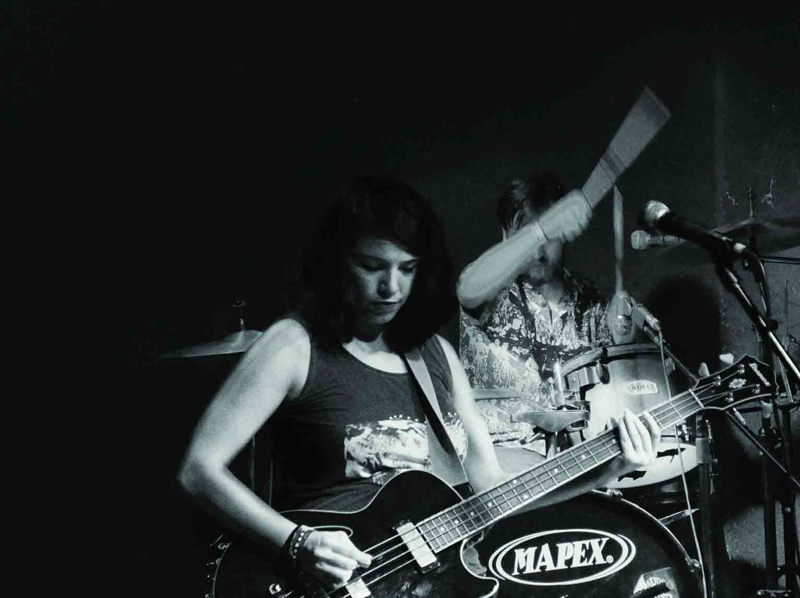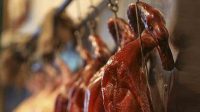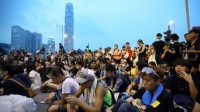Hong Kong rock’n’roll duo Shatalene have only been on stage at Beijing’s Temple Bar for a few minutes when the crowd starts whispering nervously. Bass player Natalie Belbin is poised, coolly picking out a distorted, stripped- down riff, but behind her something is wrong. Arms flailing, knees bouncing, his hair already plastered to his forehead with sweat, drummer Shaun Martin is clearly going off the rails.
“He’s been into the Jameson,” says another musician at the front of the stage, when Martin pauses between songs to rant at the audience. The musician will take the stage with Martin next with their band, the David Bowie Knives, but there’s no concern in his voice. And soon, the look of unease on the audience’s faces is replaced with a kind of crazed glee.
The drumming gets wilder and wilder, a storm of snares hit hard and symbols that seem always on the verge of falling over. Belbin’s bass playing is solid, unrelenting, and when she sings, she channels Siouxsie Sioux and Yeah Yeah Yeahs’ Karen O: “He just wants to swim in the sea/Swish his tail and smoke seaweed/Sea Panther!”
Hong Kong has a long history as a regional centre for popular music. Canto-pop dominated the Asian music market for decades and some of the world’s most popular musicians call this city home. But think of Hong Kong rock ’n’ roll and your mind swims with images of stadiums filled with families waving glow sticks, of ballads and of perfect hair. Hong Kong, it is often said, is hell for independent musicians, with few venues and an uninterested public; we just don’t have that rock’n’roll soul.
Try telling that to Gabe Andre, the David Bowie Knives’ drummer and “the best drummer in Hong Kong. No f***ing contest”, according to Martin. Andre has just played four shows, in four cities, four nights in a row. He looks very much in need of a nap: “The good thing about the Hong Kong scene is it keeps people honest. There’s no hope of quitting your day job on this thing. You play because you love it.”
I meet up with the David Bowie Knives – Martin on guitar and vocals, Andre on drums, and Alistair Reid on bass – in Beijing on the last night of their first international tour. During the past four nights they had played shows in Manila, Hong Kong, Shenzhen and Shanghai, opening for British band Scandinavia. The tour, called ScandinAsia, is also Scandinavia’s first.
ScandinAsia is the brainchild of Arthur Urquiola, a musician and Hong Kong music superfan who runs local record label Artefracture. He has released music from Scandinavia, Shatalene and the David Bowie Knives on his website on a “pay-whatever basis”.
Thanks to promoters such as Your Mum and Songs For Children, and the Clockenflap festival, Hong Kong has become a destination for world-class independent rock ’n’ roll. But I am curious about Hong Kong’s homegrown bands. These days we spend so much time focusing on importing talent, maybe it’s time we start exporting some of it.
What would the world think of our independent music? Do they even want to hear it?
We do have some great independent music across myriad genres: electronic acts such as Cleen and Snoblind, and metal bands including Weeper – who have just returned from a China tour. There’s rockabilly from Tango & Snatch, nomadic jazz from Head Clowns, and rock and punk bands such as Defiant Scum, Ponyboy and Shotgun Politics.
“My experience here has been that genres never really shine through and I think it’s fantastic,” says Urquiola, “There aren’t enough bands to have a really prolific and lasting punk rock scene, metal scene, glitch-folk scene or whatever. But what you will get is a strong and supportive scene of musicians The ScandinAsia tour: Shatalene drummer Shaun Martin (top left); the David Bowie Knives (top right and above right); Scandinavia (above left). Photos: Maya Rudolph
where ideas, ideals and friendships are the commonality as opposed to genres.”
Naively, I also wanted to experience the rock ’n’ roll fantasy of life on the road. Far from the tour buses and jets, I wanted to see what it was like for bands at the bottom, scraping by and playing for love of the music alone. If I was after authenticity, I couldn’t have done better than this group.
By all accounts, the tour lost money for everyone: band members paid for their own travel, food and accommodation. They carried their own instruments, set up their own equipment, and navigated by themselves around foreign cities.
The only thing they didn’t handle was promotion, which was left to the venues, and the venues did what could charitably be described as an uneven job. In Manila, only a handful of people show up. In Shanghai the crowd, in a frenzy, spills onto the stage. “Shanghai for me was the best,” says Martin, “probably because I wasn’t as drunk before I went on stage and can remember more of it.”
In Beijing the bands are in relatively good spirits before their final show, but the strain of managing every aspect of the tour has taken its toll. Bob Dylan typically plays more than 100 shows a year – albeit with lots of help – but when I catch up with the bands on day five of their five-show tour, they’re already on the verge of hitting a wall.
Much has been said about the rock’n’roll lifestyle, but there is nothing approaching glamour here. Over pints after sound check, the musicians tell me stories of rude taxi drivers, rushed meals of pizza in Shenzhen, how good the steak and eggs were at the Shanghai Hooters. Mostly they talk about how tired they are. They wish they had moretime and regret not being able to explore the cities, try the food, get a feel for the places they’ve visited. “We’re sure there’s plenty of culture,” Andre says before he’s interrupted by the arrival of a bowl of cheesy fries.
The debauchery seems limited to cigarettes, whisky and as many free beers as the venues will give them: Temple Bar presents each musician (and this reporter) with a bracelet for free beers all night, which everyone gleefully accepts. “We don’t discriminate, you know what I mean,” says Martin, “it could be vodka, brandy, whatever. We’re very liberal.”
The Hutongren Courtyard Hotel, the bands’ quiet and spotless digs, is painted in soft shades and makes for an incongruous rock ’n’ roll hotel. When the Bowie Knives arrive in Beijing, rumpled and hungover, from the fourth flight in as many days, they loudly promise each other: “No more whisky for me. Can’t be doing that again for a while.” But, after a nap and a shower, we’re all gathered in the communal area of a twee boutique hotel pouring Jameson shots into the hotel’s collection of miniature tea cups.
By the time sound check comes around everyone has loosened up significantly. The musicians love the look of the venue, an upstairs shot barinahippartoftownwitha nicely dingy vibe and a great sound system. They tune their instruments and the singers take turns speaking into the mic, laughing and reading names of shooters from the menu: “Liquid Cocaine, Slippery Nipple, Old Crusty, French F***.”
Staying true to form, the bands have some more beers and order cheeseburgers – the best of the tour, apparently. I join the guitarists from Scandinavia in their search for Wi-fi: they need to check their email and touch in with their day jobs.
When the show starts, the bar is only half full and almost everyone is eating and chatting. If the crowd needs some time to warm up, the bands aren’t going to give it to them: they come out rocking hard. After Shatalene, the David Bowie Knives take the stage. They are unrelenting, tearing through song after song. Conversation has stopped and all eyes are on the band as Martin leaps and sways around the stage. At some point they are joined by Nicola Parrington, the lead singer in another popular Hong Kong band, Turing Apples, and Reid’s girlfriend. In between songs, a howl of feedback fills the venue: Martin checks his guitar and then his microphone, but the noise persists. “Maybe it’s your shirt!” someone at the bar yells, pointing at Martin who is wearing a Hawaiian shirt covered in hula girls, and soon his shirt and Andre’s have been discarded.
After the unrestrained squall of Shatalene and the David Bowie Knives, Scandinavia’s controlled and catchy melodies fill the floor with dancers. The band’s bass player, Amin Samman – who grew up in Hong Kong – has become known for his deep leg lunges, and every time he does one the women in front of the stage look as if they will pass out from excitement.
Jumping up and down in a press of grinning Beijingers, my head fuzzy and full of beer, the question of whether outsiders will appreciate this music now seems silly.
The show ends when all of the bands climb up on stage, holding each other and fighting for microphone space while Scandinavia play Lionel Ritchie’s Dancing on the Ceiling, everyone shout-singing the chorus over and over again. It is the perfect end to the tour.
But the night isn’t over. The bands move to the back room. This, I think, is what I’ve been waiting for: with its stained walls, dim lights, and torn overstuffed couches the room is perfect, as seen in countless Guns N’ Roses videos and rock documentaries. A friend of the bands from years ago has turned up to catch their show and the musicians welcome him, taking turns slurping Jameson out of his navel; the bottle quickly empties. The bands split up; Scandinavia stay talking in the back room, and the Hongkongers migrate en masse downstairs to Dada, a dark and heaving dance club. Tequila shots are ordered and the evening becomes confused.
Like in a play, the lights come up in a restaurant: a small local place where the musicians are taking spicy noodles and chilli dumplings like medicine. Scandinavia are back, sitting on the pavement under the trees, and beers are ordered.
The sun comes up on the warren of alleyways around the Drum Tower – and I’m lost. The bands are gone. My jacket is streaked with what I hope is mud and I smell like a rabbit cage. When I find the hotel and enter my room I see Andre, my roommate for the night, looking even worse than me. Sunken-eyed and shaky, at first I mistake him for another casualty of the evening but he says he has food poisoning – most likely those cheeseburgers – and has spent the past eight hours on his knees in front of the toilet.
I’m supposed to share a flight home with Andre and Martin, but whenIwakeupfromanapitisless than two hours before our flight is to take off. We run for the taxi rank, Andre’s drumsticks poking out of his backpack, and Martin manhandling his guitar case trying to manoeuvre it through the press of vendors and tourists. Hungover, cranky and smelling faintly agricultural, I stand in the street holding Martin’s guitar as he frantically tries to flag down a taxi. This is not the rock’n’roll life I’m looking for, and the idea of doing this for five days, which yesterday seemed almost laughably short, now is unimaginable.
I start singing Band on the Run, but Martin either doesn’t hear me or has had enough. In a final perfect nod to rock stereotypes, we lose the drummer: Andre has wandered off and it’s impossible to find him in the crowd; we get in the taxi, defeated, and leave him behind, bound for the airport, where we will miss our flight by nearly an hour.



